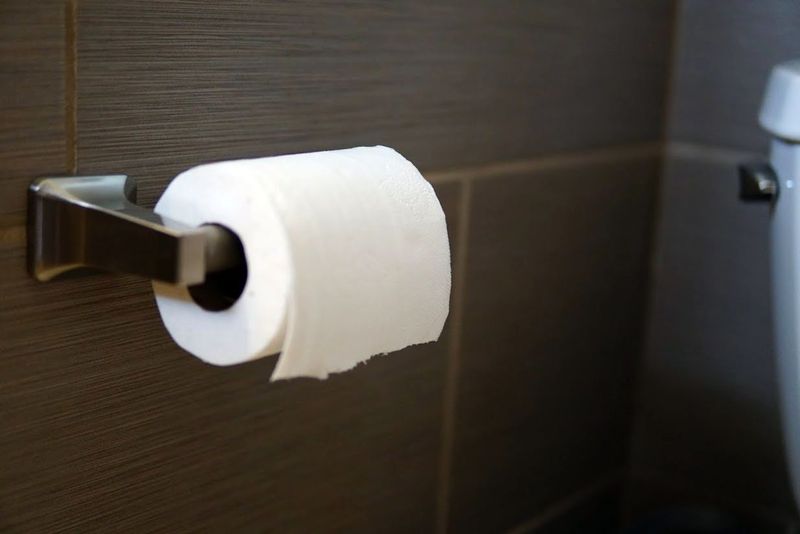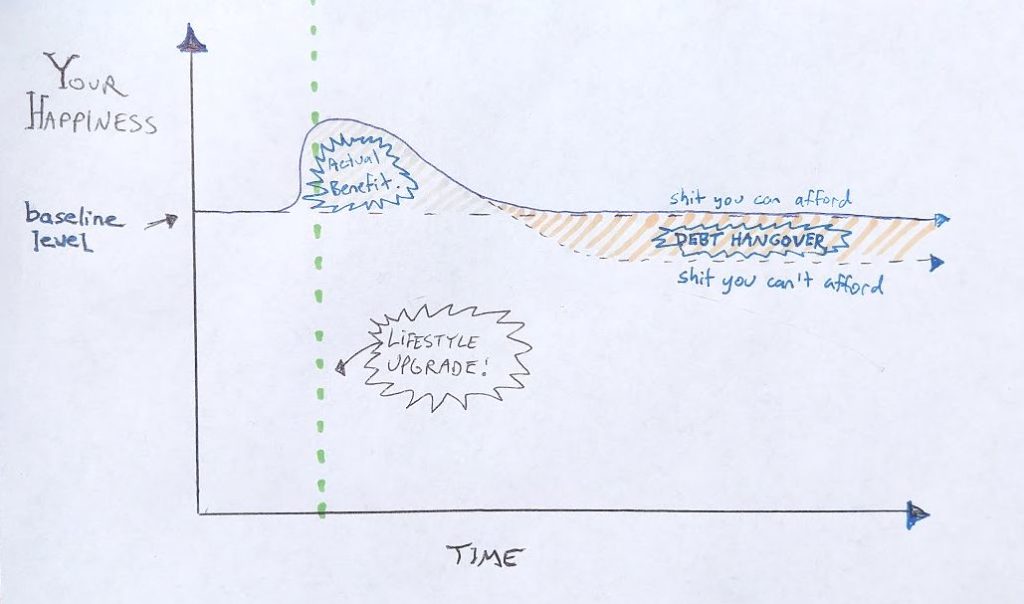Hacking Hedonic Adaptation to Get Way More For Your Money


After three years, wall-mounted toilet paper has become the latest thrill.
When I built our current house, I decided to do as much of the work as practical myself, because I learned years ago that this is the most satisfying way I can possibly live.
I love sitting back late at night, especially during cold winter nights or intense summer rainstorms, and looking up at the high ceilings and the ornately framed windows and thinking about all that structure holding itself together and protecting us so nicely inside. Satisfaction.
Sure, practicality also required some compromises - I hired out the big, repetitive task of drywall, and hired friends to work with me on the heavy parts like framing the roof.
But as soon as the house was even remotely habitable, with plywood kitchen countertops and no bathroom sink, we moved in. This allowed me to keep working on the place without being away from the family, and also to move out and stage the previous house nicely so we could put it on the market.
That was in early 2014, and true to my nature I've never really stopped working on the house since then. The first things were urgent, like quality countertops and sinks and faucets, appliances and light fixtures and functioning closets, so I did these things quickly. Then I installed a really nice woodstove before that first winter came, then built the second bathroom, and moved on to renovate our son's room in the old wing of the house that had not been part of the fully rebuilt section. Then more closets, trims, cabinetry, little features here and there as the need arose, and even the rather major feature of the detached Rock'n'roll Studio.
There have been a hundred little upgrades, always arriving with random timing, as time permitted. And the interesting thing about them has been this:
Each little upgrade - whether big or small - has brought a similar amount of short-lived but genuine happiness.
When I upgraded the countertops from plywood to stone, we were all thrilled at the new, smooth and easily cleanable nature of the kitchen. Then after a week or two, this thrill became the new normal, and it was gone.
But then, I added shelves to a closet, and fighting with piles of clothes in laundry baskets became a joyful flip through a row of hanging shirts and nicely folded pants on smooth wooden shelves. Another thrill! For another couple of weeks.
On and on these small upgrades went, each one accomplished by my own two hands, so that I got the satisfaction of a job well done, and also lived in a house that was constantly getting just a bit better every week.
Looking back, this has been so much better than just moving into a pre-made, perfect, fancy house that somebody else built for me, and doing it this way has also saved me hundreds of thousands of dollars at the same time. And even if you're not a carpenter yourself, you can get the same benefits by understanding the human pychology at work here.
Hacking Hedonic Adaptation.
You may recall me cautioning you in this long-ago MMM Classic, to avoid buying yourself fancy shit, because the thrill of every new life upgrade - whether it is a nicer dishwasher or a faster Mercedes - always wears off, and your overall life happiness returns to exactly where it was. It's quite an un-intuitive result, but if you watch yourself over time, you will notice it is uncannily accurate.
For example, I started this blog seven years ago in 2011, and distinctly remember being very happy with life, even way back then. Sure, I had problems just like everyone else, but on balance it was still a great life, because I was already pressing most or all of the actual buttons for human happiness

Some of the recipe for happiness (a slide from my WDS talk)
Since then, I have stumbled into a few upgrades:
- A nicer house
- A nicer bike (several, actually)
- A nicer car
- A nicer dishwasher
- Internet fame
- Several times more money than I had before
- A really fun new business (the MMM-HQ coworking space)
- And many, many other nicer things (clothes, electronic gadgets, interesting trips, and so on)
And yet, I'm still not really any happier than before, sitting here right at this moment. My life looks more prestigious and luxurious on paper, but since I was already extremely fucking happy with life before, there was not much to improve.
This brings up a strange paradox. Because I also remember feeling quite giddy and thrilled with each of these upgrades as I made them. Those happy feelings were genuine. What Gives?
The Happiness Bump
The phenomenon at work was the temporary thrill of a new life upgrade. If we were to sketch it out on paper, it would look like this:

The Short-term Happiness Bump from lifestyle upgrades
As you can see, you make the upgrade, and you do get some genuine thrills for a short time.
The key thing to know about your happiness is that you have a 'baseline' level. Some of it is genetically inherited, but you can also have a strong affect on it yourself, by pressing the genuine happiness buttons in the diagram above.
Most lifestyle upgrades (cars, dishwashers, or even my new toilet paper holder) do not press these buttons, unless they truly address a shortfall in your previous life.
In the best possible outcome, you might make a life change that helps you gain new skills, increase your health, or improve your life's core relationships. This could stretch out the shaded "Actual Benefit" part of the graph to be much longer, in the extreme cases for your whole life.
But in the typical outcome, most of us make changes that produce only a short bump, and then may even come back to haunt us with a payback time (which I labeled the "debt hangover" in the picture. Anything that puts you into debt, makes you less healthy or otherwise compromises your ability to live a happy life fits into this category.
Putting it into Practice
Your job as a wise, badass Human is to understand your strengths and weaknesses, and then arrange your life to make the best of things. The temptation to pursue shiny but useless upgrades is one of our biggest weaknesses. So try the following hacks:
- Consider each potential change (whether it is a purchase, a trip, or a lunch out at a restaurant) from the perspective of one year in the future. How much better will your life be in one year, if you make this decision right now?
- Delay everything and space it out as much as possible. The anticipation of a treat often provides at least as much joy as the consummation. Simply doubling your waiting period will cut your spending on this stuff in half.
- By cutting your upgrades into smaller pieces (as I did with the piecemeal home construction), you get to experience the thrill more often.
- Put your priority on upgrades that remove a strong daily negative or a barrier to happiness. For example, upgrading from a 2009 to a 2018 BMW will very likely not make you happier, but upgrading a barely-functional bike or shitty kitchen faucet to a to a good one you use daily can make a real difference.
- Find ways to modify each potential upgrade so that it presses more of your happiness buttons. Make it more challenging, do things that require you to learn or accomplish something first, choose things that allow you to create or strengthen friendships, and choose the healthier options out of any alternatives you are given.
- Use your temptation to buy or consume new things as a habit trigger: catch yourself in the moment of weakness (because this happens automatically and frequently), and use this to do something good for you instead. For example, every time I walk by my fridge and gaze longingly at the handle, thinking of pulling out a cold beer, I am reminded to go out to my back patio and do 100 pushups instead. In really disciplined times (like the last few months for me), I back this up by also not keeping any beer in the house. But even if the end result is a bubbly reward, I have improved the reward bump by packaging in a permanent benefit (fitness) with the otherwise very short term reward of a drink.
- And finally, keep a list of your top life priorities on your fridge door, or your work computer monitor, or somewhere else that you see it many times per day. Stuff like better friendships, better parenting, health, financial independence, happiness, personal growth. Looking at this list before you decide to do anything - whether it's planning a lunch or moving to a new house, can serve as a surprisingly powerful anchor to help you fine tune your happiness bumps - stretching out the good parts and eliminating the hangovers.
Happy Hacking!
In the comments: which life upgrades have you made that ended up producing neutral results or even regret, and which ones have provided more lasting happiness?